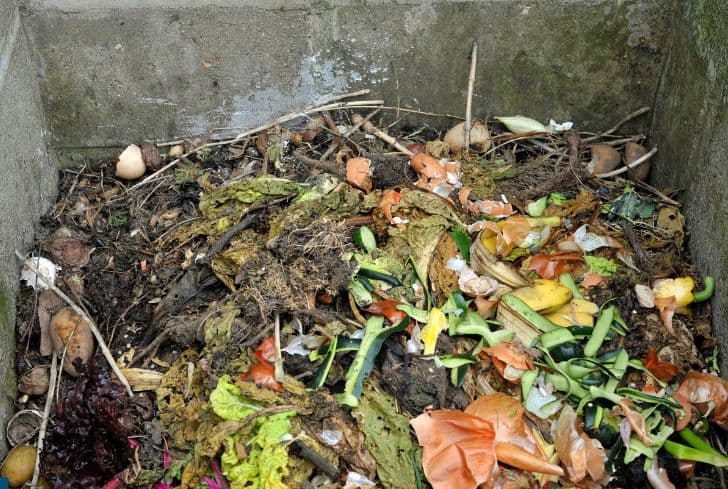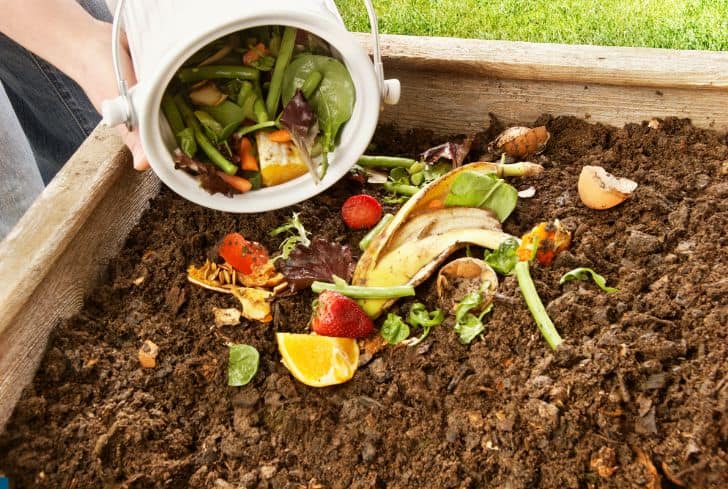Composting is beginning to become the natural solution to organic waste disposal. It achieves the aim of uniform waste disposal without putting an unnecessary strain or stench on the environment, and it helps that your plants and garden can enjoy organic matter.
If you have a compost bin, can you compost meat and bones? It is no secret that some food waste items cannot be composted, so does that include meat and bones? What are the best methods for disposing of organic waste like meat and bones?
Want to know what to consider if you choose to compost meat? Then keep reading!
Can You Put Meat in Compost?
You can compost meat in the compost, although it is not recommended as it is a food safety risk. Putting raw or cooked meat in the hot compost pile could attract rodents and pests to your garden. Not only it encourages pests but also gives refuge to pathogens like E coli bacteria that could spread diseases and damage your crops if your compost is not hot enough to kill them off.
Another issue with composting meat and bones is that it may tend to smell if the temperature of compost is not high enough or if it is not mixed in properly. Although, cooked meat will decompose faster, it is the raw meat that could create problem for you.
The thing is that meat does decompose but it could give you all sorts of trouble to deal with. Since, we think that meat is an organic material and that it should be great for our compost and which is right. The thing is it little complicated to compost meat scraps and if you haven’t done so, make sure you do it the right away to avoid unwanted pests at home.
So, even if you decide to go ahead with composting meat, make sure that the compost is turned frequently and keep the meat scraps in the interior of the compost pile.
A simple and low-effort way to compost meat is to make use of Bokashi Meat Composting. Bokashi composting is a technique that you can do indoors or outdoors, and it doesn’t smell. But that is not the most endearing part – you can also use it to compost the trickier items like waste meat.
To create a Bokashi compost bin, you need a large bucket with a lid to keep pests away and the stench in.
However, composting meat and bones in an open-air composter, tumble composter, or traditional composter will spell trouble. These techniques are not equipped for decomposing organic items like meat and bones because they are exposed, like open-air composters, or not enclosed, like traditional composters.
The problem is that decomposing meat has a putrid odor. Bones need extreme heat and moisture to break down fast.
You can see why you must do composting meat and bones in a controlled environment. Otherwise, large and small pests will either be unable to leave your property alone, or your neighbors won’t enjoy living next door.
You should not compost meat for several reasons, but it is still very much doable. In fact, it is a terrific way to provide abundant calcium and protein to your plants and soil.
Bones are rich in phosphorus, nitrogen, potassium, and calcium, nutrients every plant needs.
If your leaves have been notorious for having yellow or pale green patches and experience stunted growth, it indicates that nitrogen is required. You will know if the missing nutrient is phosphorus because the leaves will have browning and drying edges.
A potassium deficiency can also be rectified with bone and meat matter, but you must know how to carry out the process correctly.
Three Reasons Why You Shouldn’t Compost Meat
We will not explore too many reasons you can’t compost meat because there aren’t many.
The significant problems with composting meat can easily be resolved, but let’s explore them anyway:
1. They attract rodents
Doubtless, composting meat and bones invite pests and rodents to raid your garden or yard. If you flout the rules of composting meat, you will not like the results, which is why many people discourage it.
Rodents can perceive smells from miles away unless you do the needful. Don’t worry about that just yet; we will provide exclusive hacks for composting meat.
2. There is a risk of pathogens
Yes, pathogens are also hazardous to composting meat and bones in your garden. Don’t get it twisted – you need bacteria and fungi to break down the materials in your compost bin.
However, some are harmful, like E. coli and staphylococcus. Salmonella is also found in meat; these bacteria need extreme heat to lose their potency.
Therefore, if you don’t compost meat at the right temperature, you will likely infect your plants and other application areas with diseases.
3. The smell is highly off-putting
Have you ever perceived the stench of rotten meat? Well, it stinks up the place, and you don’t want that erupting from your yard or garden for your sake and your neighbors.
Overall, you can compost meat and bones, but you will want to consider whether the requirements are worth the results.
Can You Compost Cooked Meat?
Yes, you can compost cooked meat, even though it is not quite advisable. The smell from the cooked meat could be even greater and more aromatic, drawing pests to disrupt the items in your compost pile. Also, if the cooked meat isn’t refrigerated or frozen, it’s still vulnerable to bacterial invasion.
Even if you need to bury the cooked meat in a compost pit, you must ensure it remains at least twelve inches below the surface.
If you think the smell of seasoned meat will not attract pests, think again. Fortunately, a way to prevent rodents from reaching any type of decomposing meat is by using a compost bin with a cover.
That is even better if it is suspended and guarded with chicken wire or some other protective coverage.
Alternatively, you can bury cooked meat in a compost pit, but you must ensure it remains at least twelve inches below the surface. You must also cover the meat with enough organic waste so that heat concentrates on it.
Furthermore, the amount of meat you compost should be small. Too much meat means a mess you will not like cleaning up. Before composting cooked meat, ensure that you have a suitable medium for it.
The compost bin you will use should be appropriate, i.e., it must have a lid, be suspended well above the ground, or be protected from rodents at the very least.
You also need to consider your plans to prevent the smell from disturbing the neighborhood. A simple solution would be placing your compost bin somewhere out of general reach.
Composting cooked meat is relatively okay because the heat from the cooking process has already killed the harmful microorganisms in the food, even though they may come back when rot sets in.
Can You Compost Raw Meat?
No, composting raw meat is not advisable because of the diseases it can unleash. Although technically, you can compost it, there are high chances that the portion you are putting in the compost bin contains pathogens like salmonella and E. coli.
The Environmental Protection Agency mainly preaches against composting raw meat.
Meat is organic matter that was derived from a previously living creature. Therefore, it won’t be a hassle for microbes and other factors required for biodegradation to break it down.
However, there is a caveat. You cannot mishandle raw meat, especially if it has gone bad. It is especially advised that you put on a pair of gloves to avoid touching it directly.
This is because the wrong contact can spread diseases, and even disposing of it wrongly can have the same effect.
Furthermore, you cannot use just any compost bin or risk spreading diseases like salmonella and E. coli because they thrive in rotten proteins like meat.

Things to Consider Even if You Decide to Compost Meat
The most important thing to consider when composting meat is the temperature. This is because adequate heat is required if you want the decomposition process to occur fast.
Furthermore, adequate heat is required to kill any harmful pathogens in the meat. The thing about proteins like meat and egg is that it is easy for them to harbor harmful bacteria that can cause food poisoning.
These bacteria can accompany the meat to the compost bin, and if there is inadequate heat, you may spread the diseases to the plants you apply the compost mix to.
Another thing you should consider before composting meat is the compost method you will use. Remember, the meat releases a putrid stench while decomposing, but before then, it smells appealing to rodents.
So, there are two entities you must consider when choosing your composting method – rodents for when the early stages of decomposition and yourself and your neighbors for the decomposing stage because the meat will stink up the place!
That being said, in-vessel composting is the best way to compost items like meat. A bokashi bucket or some other compost bin with a lid will do. But you must ensure that it allows you to check the temperature and fluff the compost mix to allow aeration.
When you have tackled the problem of the stench that erupts, you can now worry about ensuring every harmful pathogen dies before the composting period elapses.
Composting meat is not as technical as it is made out to be. If you are familiar with composting rules, you will get the hang of it without harming your plants and the soil.
What Happens if You Put Meat in Compost?
If you put meat in a compost bin, it decomposes because it is organic matter. However, there may be some uncharacteristic smells, among other problems. A most important concern when composting meat is the smell that erupts while it rots. Before then, it smells good, especially if it has been cooked. This will no doubt attract rodents and bugs, and you won’t like the sight.
But that is if they don’t mess up your yard while searching for the food source.
You don’t want to run into mice and squirrels in your garden. Not only would they destroy your plants and eat your fruits, but they will also leave a mess. And you are encouraging them to come back.
You can rectify the problem by using the right composting method.
Another problem with composting meat is the way it breaks down. It develops a mushy texture that creates an environment with inadequate oxygen flow. Unless you fluff your compost pile regularly, the mix will only rot, not decompose.
Remember how meat creates an anaerobic environment? Well, that is not good for a compost pile. It causes an unbearable stench and acidity that may affect the quality of your compost mix. Besides, too much acidity is not suitable for the soil or plants.
How Long Does it Take for Meat to Decompose?
It takes one to three months for meat to decompose. But you must provide the right environment. Control the temperature, moisture content, and oxygen access. If these conditions are not regulated, meat may not decompose properly or fast.
That is the difference between throwing meat straight onto the ground and burying it at least twelve inches below the surface or placing it deeply amid other organic matter.
Leaving meat to biodegrade will take a long time, and that is if a neighborhood dog or friendly squirrel doesn’t find it first. But if you apply proper decomposition guidelines, you can turn meat into garden gold for your plants and soil.
How to Dispose of Raw Meat Scraps?
To dispose of raw meat scraps, do not throw them in the compost pile. That is the most important step. This is because these food items contain a horde of harmful bacteria from salmonella to E. coli, and you can easily spread them to your soil and plants.
When handling raw meat scraps for disposal, wear a pair of gloves. Then, pack the pieces into a sealable bag and throw them straight into the garbage can. Ensure you close the lid to prevent rodents and bugs from upheaving the contents and messing up the place.
Conclusion
Meat has many nutrients; there is no doubt about it. But you must be selective about the items you will add to your compost, both for the sake of health and hygiene.






